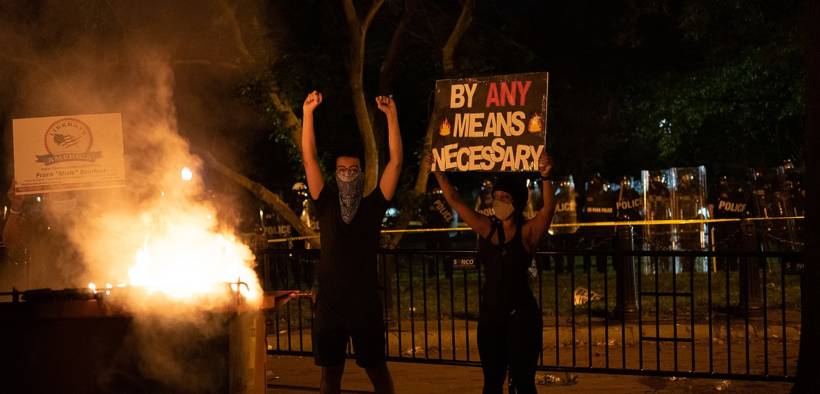As Protests Continue, Activists and Labor Organizers Call for Juneteenth Strikes

“Racial justice is union business.”
In the aftermath of four Minneapolis police officers murdering George Floyd, media coverage has focused on the street actions of protestors. But, with the protest and movement evolving some activists are looking to take the Black Lives Matter protests to the workplace.
The International Longshore and Warehouse Union (ILWU) announced they will shut down 29 ports on the West Coast in solidarity with antiracist protests. Last week, the union stopped working for nine minutes to honor George Floyd, and on their website, the ILWU said, “racial justice is union business.”
The ILWU’s mass protest is a union’s biggest action since Minneapolis and New York bus drivers refused to transport protestors to jail for the police.
But the ILWU protest will cause much more economic disruption, with some estimates at nearly $2 billion of daily damage to the American GDP if both coasts shut down ports for a five-day period.
The largest federation of unions in the US, the AFL-CIO, is also under increasing pressure to sever ties with powerful police unions. But large union bosses have been unwilling to take on police unions and have instead decided to stay quiet on the subject.
Increasing number of strikes?
With a deadly pandemic in the mix, the United States has seen an uptick in strikes since March, including many in the meatpacking industry where workers have been exposed to the coronavirus at high rates.
And according to Payday Report, an independent media outlet covering labor, strikes have doubled since the wave of Black Lives Matter protests. On an interactive map, Payday Report has tracked 600 strikes since the beginning of March with Juneteenth strikes expected to grow the number.
Under the hashtag #StrikeForBlackLives, activists have been promoting a general strike on Juneteenth. On the Strike for Black Lives website, activists have placed an emphasis on Washington D.C., the nation’s capital. The group is calling for strikes, sick-outs, blockades, occupations, and marches nationwide and protests at American embassies worldwide.
Black Lives Matter chapters in D.C. and Louisville have promoted the general strike, and the cross-organizational strike involves multiple unions.
D.C. has been a hotbed for protests and police brutality in response to growing unrest. The deaths of Breonna Taylor and David McAtee in Louisville, Kentucky have gained national attention and sustained three weeks of protests.
Bridging the Gap
One of the most widespread protests according to Payday Report’s interactive map has been the Shut Down Stem strikes organized at universities across the country. Black academics called on their white colleagues in science to stop their research for one day to do three things: educate themselves, take action to be actively anti-racist, and promote healing.
On June 10th many universities and research institutes shut down, but the stated goals of the strike are much different than the planned Juneteenth strikes.
The Shut Down Stem strikes were aimed at promoting awareness of what scientists can do to make their workplace more inclusive, but Juneteenth protests are arguably more difficult to organize. With most universities still closed due to coronavirus, the Shut Down Stem protests were less disruptive than the planned port shutdowns will be.
Also, as America reopens its economy despite spiking cases in several states, widespread economic disruption threatens the current government’s focus on the economy.
But organizers are faced with a difficult task: many Americans are out of work and in precarious employment conditions during an economic recession. The Shut Down Stem strikes have shown that a coordinated nationwide strike in one industry is possible, but how large Juneteenth protests will be up to strong organization and collaboration with large unions.
The ILWU is hopeful that they can convince their coworkers on the Eastern shore to spread the port shutdowns across the country.















